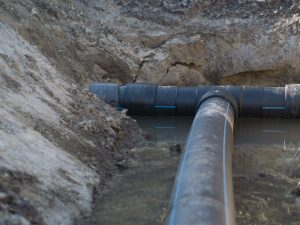HDPE Pipe Contractors NJ
Our expertly trained crew is experienced in fusing high-denisty polyethylene (HDPE) pipe for gas, water, sanitary and other utilities
 High-Density Polyethylene (HDPE) pipe is a versatile thermoplastic piping material that has become a preferred choice in various industries. Its widespread use can be attributed to a number of remarkable properties that set it apart from traditional pipe materials. HDPE pipes are highly regarded for their corrosion resistance, lightweight construction, flexibility, and outstanding durability. Below is a summary of the many benefits and applications of HDPE pipes.
High-Density Polyethylene (HDPE) pipe is a versatile thermoplastic piping material that has become a preferred choice in various industries. Its widespread use can be attributed to a number of remarkable properties that set it apart from traditional pipe materials. HDPE pipes are highly regarded for their corrosion resistance, lightweight construction, flexibility, and outstanding durability. Below is a summary of the many benefits and applications of HDPE pipes.
Corrosion Resistance: One of the most significant advantages of HDPE pipes is their remarkable resistance to corrosion. They are impervious to the corrosive effects of chemicals, acids, and salts, making them well-suited for applications in environments where conventional metal pipes would rapidly deteriorate. This resistance ensures the longevity and reliability of HDPE pipes in a wide range of conditions.
Lightweight Construction: HDPE pipes are significantly lighter than their counterparts made of materials like steel or concrete. This characteristic translates into several practical benefits. The reduced weight simplifies transportation, handling, and installation. It also means that smaller, less robust support structures are required, potentially leading to substantial cost savings in terms of labor, equipment, and materials.
Flexibility: HDPE pipes are inherently flexible, allowing them to bend and adapt to the terrain or obstructions without the need for numerous fittings and connectors. New Jersey experiences cold winters, with freezing temperatures that sometimes reach sub-zero. HDPE pipes are well-suited to this climate as they remain flexible and durable in cold climates, reducing the risk of pipe fractures or damage due to freezing and thawing cycles. This flexibility also extends to their ability to be coiled, which is particularly advantageous in situations where long, continuous lengths of pipe are required. Fewer connections mean fewer opportunities for leaks and a more robust and reliable system.
High Flow Capacity: The smooth inner surface of HDPE pipes reduces friction and promotes a high flow capacity. This quality is especially beneficial in applications where the efficient and rapid transport of liquids is essential, such as water supply and sewage systems. HDPE pipes help maintain optimal flow rates while minimizing energy consumption.
Long Service Life: HDPE pipes are known for their impressive service life, often exceeding 50 years or more. Their resistance to aging, weathering, and degradation means they remain in service for decades, reducing the need for costly replacements or repairs. This longevity contributes to cost savings over the long term.
Low Maintenance: Once installed, HDPE pipes typically require minimal maintenance. Their durable construction, and longevity ensure that they perform reliably with minimal upkeep. This reduces operational costs and is particularly advantageous in critical infrastructure applications.
Leak-Free Joints: HDPE pipes are fused together using heat or electrofusion, creating leak-free joints. This fusion process eliminates the need for gaskets, bolts, or adhesives, thus reducing the potential for leaks at connections. This attribute is critical in applications where leaks could be environmentally or economically damaging.
Chemical Resistance: HDPE is highly resistant to a wide range of chemicals, making it an ideal choice for industrial applications where exposure to aggressive substances is a concern. This chemical resistance ensures that HDPE pipes maintain their integrity and functionality in challenging environments.
Environmentally Friendly: HDPE is an environmentally friendly material. It is recyclable, and the recycling process does not significantly degrade the material’s quality. This promotes sustainability and reduces the environmental impact of using HDPE pipes in various applications.
Thermal Insulation: HDPE pipes have a relatively low thermal conductivity, making them suitable for applications that require insulation. This property is valuable in situations where the transport of hot or cold fluids is involved. HDPE pipes help maintain the desired temperature of the transported material while conserving energy.
Versatile Applications: The adaptability of HDPE pipes allows them to be used in a wide range of applications. Some of the common applications include water supply, wastewater management, gas distribution, utility processes, agricultural irrigation, and more. The versatility of HDPE pipes makes them an ideal choice for various industries and infrastructure projects.
High-Density Polyethylene (HDPE) pipes have become a preferred choice for various industries due to their exceptional properties and numerous advantages. Their resistance to corrosion, lightweight construction, flexibility, durability, and longevity make them a practical and cost-effective choice for a wide range of applications, from water supply and sewage systems to industrial processes and beyond. HDPE pipes offer efficient and reliable solutions while also contributing to sustainability through their recyclability and low environmental impact. As a versatile and dependable piping material, HDPE continues to play a vital role in modern infrastructure and industry.


